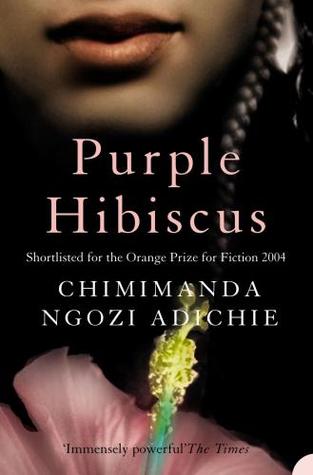Author: Chimamanda Ngozi Adichie
 Yes, I have read Half of a Yellow Sun, and I have also read Americanah. I’ve watched loads of this woman’s speeches and read some of her short stories featured in online publications. No, I have not yet read The Thing Around Your Neck, but even so, I hold fast to the belief that I now have: Purple Hibiscus is her most relevant work. (To me.)
Yes, I have read Half of a Yellow Sun, and I have also read Americanah. I’ve watched loads of this woman’s speeches and read some of her short stories featured in online publications. No, I have not yet read The Thing Around Your Neck, but even so, I hold fast to the belief that I now have: Purple Hibiscus is her most relevant work. (To me.)
I have been absolutely astounded to discover that mainstream media has gotten Half of a Yellow Sun to all but overshadow Purple Hibiscus to the point of near obscurity. I have tried and tried to find an article, interview, whatever, of Chimamanda, specifically in relation to this book (not Half of a Yellow Sun with Purple Hibiscus casually thrown in) and I have failed. All I seem to be getting is a bunch of websites with lesson notes. This isn’t at all what I am looking for.
[Side note: I have been holding in for so long a rant about how we have managed to reduce a lot of great things to technical academia, which sometimes renders discussion of said pieces of work nearly non-existent outside of the classroom context. But this is not the time. *upside-down smiley emoji *]
I have been looking for something more along the lines of how this book changed some teenager’s perception of African literature, shook a devout parent, dissembled an oppressive African environment… But more than that, I have been looking for an explanation, perhaps from Adichie herself, of the paradoxical nature of many of the characters.
I have to say that this book has been the most emotionally taxing book I have read all year. It is not inherently the most painful. I think the most painful so far has been A Thousand Splendid Suns. But the reason this got me in my feels so much and so hard is that I could personally recognize – like really recognize, as if I had known them in real life – just about all of the characters. Engaging with this book was intense, I can’t even lie.
I know I could never have written it, though, because of the perspective it was told through; Kambili, the quiet, the falsely indoctrinated, the academically brilliant but otherwise foolish main character, really threatened to get me to punch my Kindle multiple times. I could barely stand her thoughts and decisions, even though I knew why they were what they were. The thing is that, I’m just not that kind of person. The flame in Amaka and her fearless outspokenness is the only perspective I could have possibly told this story though Plus the ridiculous inferiority complex and all.
With this story told through Kambili, it was like a thick, translucent sheet had been placed over a raging sea. When you watched it, you didn’t get the full experience. Or maybe I should rather compare it to a bunch of words being told through a text-to-speech application, as opposed to an emotive human being reading something to you.
I really could talk about this book continuously but I want to focus on this thing that has been bothering me since: the character of Eugene. He is one of the biggest character paradoxes I have ever read, and the book still ended with him unexplained. It rather perplexed me further!
I simply could not – absolutely not – understand how a man could so thoroughly brainwash himself into becoming full of hate for anything contrary to a deity he really does seem to have made up for himself. God wasn’t his god; religion was. Religion in the sense of habitual practices, and orders followed. And it’s not like he was that much of a hypocrite too; he actually seemed to fully believe in all that he did. My brain refuses to wrap its head around a well-meaning tyrant.
For someone who frequently abused his wife and children in the name of religious discipline and implicitly encouraged perpetual silence about the matter (and just general subdued demeanours that turned his whole family into metaphorical robots), I fail to see how he was so devoted to the exposure of the scandalous truth of his country that he was the publisher of the Standard, whose content consistently got people in political trouble. It simply doesn’t add up. Especially not how protective he seemed to be of Ade Coker.
That’s another thing. I’m not entirely sure what exactly the relevance of Ade Coker was in the story. Maybe it was just to confuse me. It did cross my mind that maybe Eugene and Ade had some sort of affair, and Eugene’s tyrannical religious ways were his mechanisms of dealing with the guilt. But then if that is true, what was the point of him recounting the abomination (can’t recall the specific words he himself used) of that one time he masturbated to Kambili?
The final stroke of confusion was when he was discovered to have anonymously donated money to charities and such. But he couldn’t take care of his own father, and nearly ostracized his broke sister and her family? I swear, I don’t get it. And Adichie had the gall to end the book without explaining all this to me. Like, I’m mad. And I can’t even find a single decent interview. (But if you can find one for me, that’d be great. LOL.)
There are so many relevant themes that I know I won’t touch on now. But now that I’ve read the book, it/they will start popping up slowly in my conversations and subsequent writings.
I think everyone should read this book. I really do. Also, I may have a crush on Obiora. But that’s just by the way. J
This is what I felt was the single, most centrally relevant quote, by Aunty Ifeoma’s friend:
“It is what happens when you sit back and do nothing about tyranny. Your child becomes something you cannot recognize.”
-Akotowaa

Leave a reply to The Traveler Heart Cancel reply